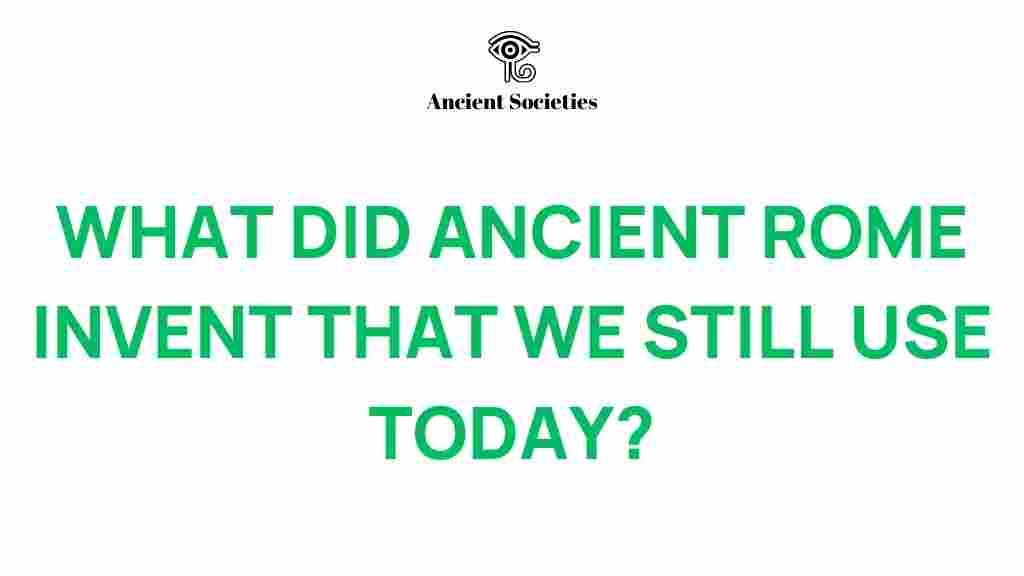Discovering Ancient Rome’s Innovations That Shape Our World Today
Ancient Rome was a civilization that not only conquered vast territories but also pioneered numerous inventions and innovations that have profoundly influenced modern society. From engineering marvels to architectural wonders, the legacy of Ancient Rome continues to shape our world today. In this article, we will explore the remarkable contributions of Ancient Rome in technology, society, engineering, architecture, and their enduring cultural impact.
The Engineering Marvels of Ancient Rome
One of the most significant aspects of Ancient Rome’s innovations is its engineering prowess. Romans were master builders who introduced advanced techniques that transformed construction and infrastructure. Here are some key engineering innovations:
- Aqueducts: These impressive structures transported water from distant sources into cities, revolutionizing urban living. The Aqua Appia, built in 312 B.C., is a prime example of this innovation.
- Concrete: The Romans perfected the use of concrete, allowing them to create durable structures that have withstood the test of time, such as the Pantheon and the Colosseum.
- Road Systems: Ancient Rome developed an extensive network of roads that facilitated trade and military movement. The saying “All roads lead to Rome” underscores the importance of this innovation.
Architectural Innovations
Architecture in Ancient Rome was characterized by grandeur and functionality. Roman architects introduced several innovations that are still relevant today:
- The Arch: The use of the arch allowed Romans to create larger and more stable structures, leading to the development of impressive buildings and bridges.
- Dome Construction: The Romans were pioneers in dome construction, exemplified by the Pantheon, which remains the largest unreinforced concrete dome in the world.
- Public Buildings: The design of public buildings such as basilicas and forums laid the groundwork for modern civic architecture.
Technological Innovations
The technological advancements of Ancient Rome are numerous and varied. Here are some notable inventions:
- Roman Numerals: This numerical system was developed and used extensively in various aspects of Roman life, from commerce to engineering.
- Central Heating: The hypocaust system was an early form of central heating used in baths and wealthy homes, showcasing Roman ingenuity in climate control.
- Surgical Tools: Romans made significant advancements in medicine, developing various surgical tools that laid the foundation for modern surgical practices.
Social Innovations and Their Impact
Ancient Rome’s innovations extended beyond technology and engineering into social structures and governance:
- Legal Systems: Roman law has significantly influenced modern legal systems, with concepts such as justice, equality, and civil rights originating from Roman legal principles.
- Urban Planning: The Romans implemented systematic urban planning with grid layouts and public amenities that are evident in contemporary city designs.
- Public Health: Innovations in sanitation and public health, including public baths and sewer systems, have shaped modern public health practices.
Cultural Impact of Ancient Rome
The cultural innovations of Ancient Rome have left an indelible mark on art, literature, and philosophy:
- Literary Contributions: Roman authors such as Virgil and Cicero have influenced Western literature, with their works continuing to be studied today.
- Art and Sculpture: Roman art and sculpture set standards for realism and expression that influenced Renaissance artists and continue to inspire modern art.
- Philosophy and Rhetoric: Roman contributions to philosophy and rhetoric have shaped intellectual discourse and education in Western civilization.
Step-by-Step Process: Understanding Ancient Rome’s Innovations
To appreciate the full scope of Ancient Rome’s innovations, it is essential to understand the context and processes behind these advancements:
- Research the History: Gain a foundational knowledge of Roman history, including key figures and periods that influenced technological and cultural developments.
- Analyze Specific Innovations: Focus on specific inventions such as the aqueducts or concrete, understanding their engineering principles and societal implications.
- Study the Cultural Context: Examine how social structures, government, and daily life influenced the innovations and their acceptance in society.
- Explore Modern Applications: Assess how these innovations are reflected in modern technology, architecture, and law.
Troubleshooting Tips: Overcoming Myths About Ancient Rome
As we explore Ancient Rome, it’s important to address common misconceptions:
- Myth: Romans only copied Greek innovations. Reality: While influenced by Greek culture, Romans innovated significantly, developing techniques and concepts that were uniquely their own.
- Myth: Roman society was stagnant. Reality: Ancient Rome was dynamic, with continuous advancements in technology and culture throughout its history.
- Myth: All Roman structures were built by slave labor. Reality: While slaves did contribute, many skilled workers and engineers were also integral to Roman construction projects.
The Enduring Legacy of Ancient Rome
The legacy of Ancient Rome is evident in various aspects of modern life. From legal principles to architectural styles, the innovations of Ancient Rome continue to inform contemporary society:
- Legal Foundations: Many legal systems worldwide are based on Roman law, influencing concepts of justice and governance.
- Architectural Influence: Roman architecture has inspired countless buildings, with neoclassical styles seen in government buildings and monuments.
- Engineering Standards: The engineering techniques developed by Romans set benchmarks for modern civil engineering and construction.
For further reading on the impact of Ancient Rome on modern society, consider visiting this resource.
Conclusion
In conclusion, the innovations of Ancient Rome have had a profound and lasting impact on our world today. From engineering and architecture to legal systems and cultural contributions, the legacy of Ancient Rome continues to shape our society. By understanding these innovations, we can appreciate the ingenuity of this ancient civilization and recognize its ongoing influence in our modern lives.
As we move forward, it is essential to acknowledge and learn from the lessons of history. The innovations of Ancient Rome remind us of the importance of creativity, adaptability, and the pursuit of knowledge in shaping a better future.
This article is in the category Technology and created by AncientSocieties Team
